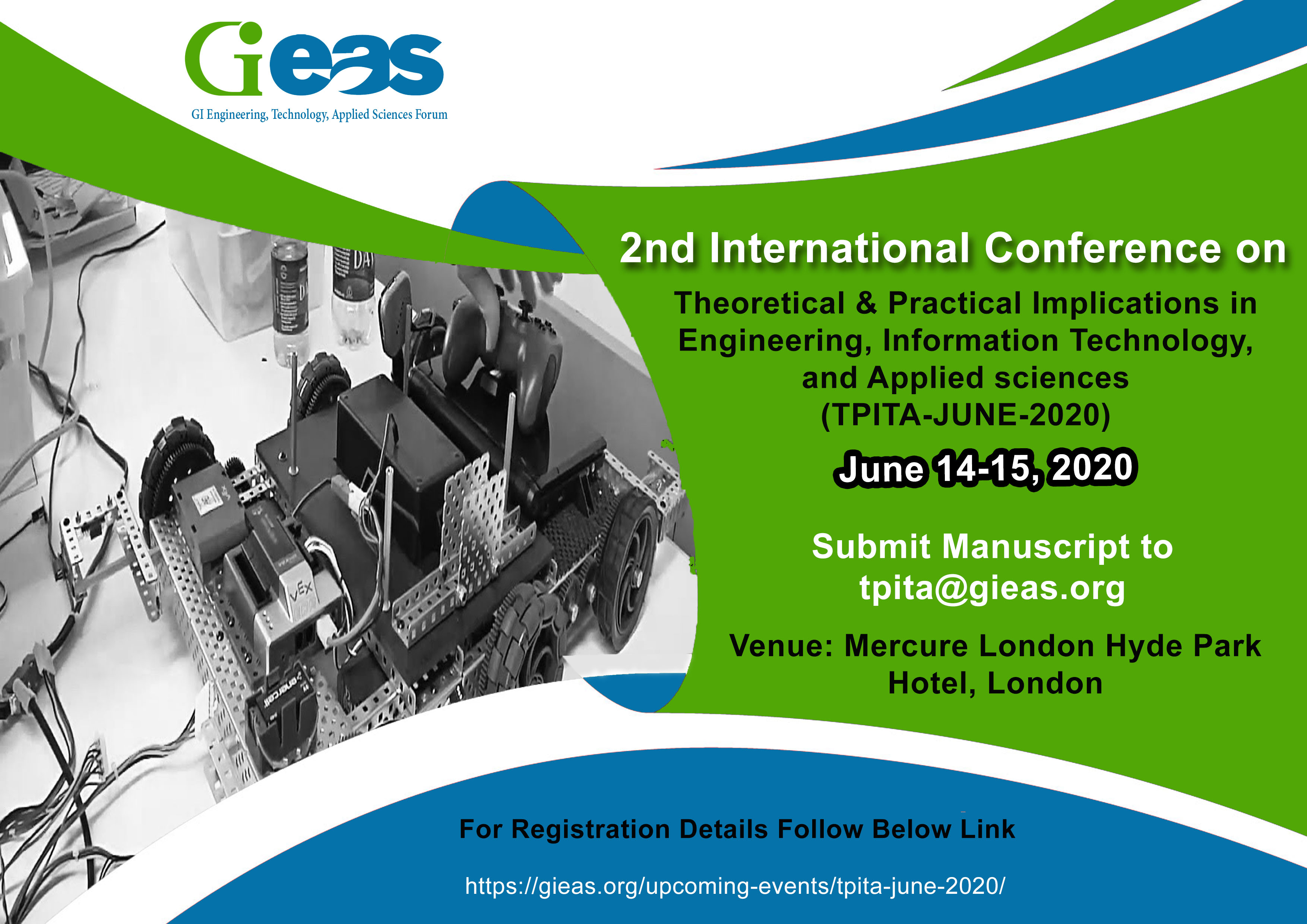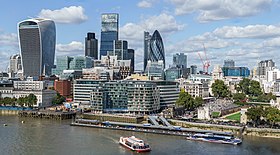Theoretical & Practical Implications in Engineering, Information Technology, and Applied sciences
(TPITA-JUNE-2020)
Venue: Mercure London Hyde Park Hotel, London
“Due to current conditions, we will facilitate our participants through virtual/online presentations with less fee (Faculty Members fee 200 USD and Students fee 100 USD), after virtual/ online presentations we will publish their papers free of cost in our associated journals which are indexed in EBSCOhost, Ulrich’s Periodical Directory, Latindex (Directory), Index Copernicus, Road, MIAR, Dimensions, Crossref and Google Scholar.”
June 14-15, 2020
Abstract Submission Date
May 15, 2020
Full Paper Submission Date
May 30, 2020
February 28, 2020
Venue
Mercure London Hyde Park Hotel, London
Pay Registration Fee Through Credit Card
tpita@gieas.org
For Presenter registration
Click here
For Attendee registration
Click here
CALL FOR PAPER
The invited talk proposals can be submitted to tpita@gieas.org
The objective of GIEAS Forum is to provide a platform for researchers, engineers, academicians as well as industrial professionals from all over the world to present their research results and development activities in Engineering, Technology and Applied Sciences.
This conference provides opportunities to the researchers to exchange new ideas and application experiences face to face, to establish business or research relations and to find global partners for future collaboration. Boundaries between state of the art and revolutionary innovation constitute the computing frontiers that must be pushed forward to provide the support required for the further advancement of various fields of engineering & technology. This common platform is expected to provide the bases for joint venture among different fields to serve the society in a better way.
All submitted abstracts/ papers / posters will go through a blind peer review process and accepted manuscripts will be published in conference proceedings. Conference proceeding will be submitted to ISI Thomson Reuters Web of Science for consideration and indexation.
Selected conference papers will be published in special / Scopus indexed journals associated with this conference. Associated journals will allocate a special / regular issue for papers submitted to this conference.
CALL FOR SPECIAL SESSION
If you would like to propose a special session to TPITA, you are invited to send your “special session” proposal to the Program Committee.
Format:
1. Sessions will generally be 1 hour in duration. Time should be included for audience participation.
2. All participants must be registered for the overall TPITA-2020 conference.
3. Please use the contents below for your session proposal.
4. In case of further clarification or any assistance required before completing the proposal you can email at tpita@gieas.org
At least the moderator and two other panelists must be registered for the conference, so work on the schedule and proceedings can begin.
How to Propose Special Session
TPITA 2020, Session Proposal must include the following information:
1. Title: Title of your session proposal
2. Aims and Objectives of the Panel: Explain why such a session is relevant to TPITA and to the Theme of TPITA. (Max 5-10 lines)
3. Occurrence/Novelty: Please describe either past instances or the novelty of new ventures here. (Max 10 lines)
4. Description: Use this to clarify scope, audience and focus. Give aims and objectives for your session here. This will become the “abstract” for the proceedings and program. (Max 20-25 lines)
5. Event Structure/Agenda: Describe what organizers and participants will do during the session. E.g., will there be a series of fixed presentations and then discussion, and/or will the moderator ask questions to which first the panelists and then the audience may respond. What are the main questions you would ask? (Max 20 lines).
6. Session Members: List all names, affiliations, and emails of all anticipated panel participants, and state if they have accepted the invitation to participate should the panel be accepted. Include the moderator/organizer.
7. Qualifications of panelists: Briefly describe your and your fellow panelists’ backgrounds and qualifications/ areas of expertise in the related research/practitioner domain.
CALL FOR SESSION MODERATORS
We invite scholars to become session moderators in the following tracks:
- Fundamental and Applied Sciences
- Material Science and Engineering
- Electrical and Electronic Engineering
- Computer Engineering and Sciences
- Mechanical Engineering
- Biological Engineering
- Chemical Engineering
- Civil Engineering
- Environmental Engineering
All interested scholars should send their consent to tpita@gieas.org by mentioning their area of interest. For this voluntary service, all session moderators will be awarded a certificate of appreciation by the TPITA 2020 secretariat.
GUIDELINES FOR SESSION CHAIRS
In this International Conference “Theoretical & Practical Implications in Engineering, Information Technology, and Applied sciences” several sessions will be held based on different themes and areas of interest.
- Session chairs are requested to kindly check the Schedule of conference.
- Check the date, room and time of the sessions that they are chairing.
- Main task of session chair is to motivate the presenter/researcher to share his/her knowledge on the particular topic and also make conducive environment so the participants may have an intellectual discussion on the subject.
- Session chair can share his/her own knowledge, research, experience, observations very briefly if time permits.
- Please ensure your availability at assigned room at least 5-10 minutes prior to the beginning of session. This will help you to acquaint with the working of Laptop and multimedia etc. Please contact the control room, in case of any problem.
- Please choose your seat in front row, so participant may see and interact with you easily.
- Please introduce yourself and greet the participants of session.
- Make attendance of presenters of your session to ensure their presence in the room.
- Make an announcement regarding the allocation of time to each presenter. Time for each presentation is of 10 minutes followed by 5 minutes of Question & Answer session. However, session chair may extend the time of presentation keeping in view the allotted time for session.
- Session chair is responsible for session to be completed on time.
- Before inviting presenter(s), announce their full name(s) and the title of the paper.
- Best session paper has already been decided by our distinguished reviewers and his/her name will be conveyed to you, you will announce this at the end of session and present a certificate to researcher.
- You will have to decide “Best Presenter of Session” by filling in the evaluation form provided to you and certificate will be awarded in the closing ceremony.
- At the end of session, distribute the certificates of presentation, convey expression of thanks on your personal and GIEAS behalf to the presenters and the participants.
- In case of any sort of confusion, please contact conference chair or management of GIEAS.
CALL FOR REVIEWERS
We invite scholars to become session moderators in the following tracks:
- Fundamental and Applied Sciences
- Material Science and Engineering
- Electrical and Electronic Engineering
- Computer Engineering and Sciences
- Mechanical Engineering
- Biological Engineering
- Chemical Engineering
- Civil Engineering
- Environmental Engineering
All interested scholars should send their consent to tpita@gieas.org by mentioning their area of interest. For this voluntary service, all reviewers will be awarded a certificate of appreciation by the TPITA 2020 secretariat.
PLAGIARISM POLICY
According to plagiarism policy of TPITA-2020 all full papers considered for proceeding publication will go through plagiarism check using “TURNITIN” software and acceptable level of similarity index is 20%. Irrespective of initial abstract acceptance, full papers with more than 20% similarity indexed will not be published in online full paper proceeding. All authors are deemed to be individually and collectively responsible for the content of papers published by TPITA-2020. Hence, it is the responsibility of each author to ensure that papers submitted to TPITA-2020 should comply with the ethical standards with respect to plagiarism.

Dr. Tariq Iqbal Khan (Ph.D.)
Dr. Tariq Iqbal Khan (Ph.D.), Assistant Professor at University of Haripur KPK, Pakistan. He has completed his PhD in Human Resource Management from Muhammad Ali Jinnah University Islamabad Pakistan. Dr Tariq has extensive background in HR generalist affairs, including experience in employee recruitment and retention, staff development, mediation, conflict resolution, benefits and compensation, HR records management, HR policies development and legal compliance. His scholarly work has been appreciated and published in world renowned journals. His research interests include knowledge management, advance quantitative technique, strategic human resource management, organizational behavior, training & development. Having served as the corporate human resource professional, his list of contributions towards development of society and humanity is long enough to hold the responsibility of Director Global Operation at Global Illuminators. Dr. Khan has earned a commendable repute across the globe due to his services towards society.
He has thorough capabilities in general management, human resource management, industrial relations, administration, and areas of organisational development with particular interest lying in designing, developing, and implementing training programs, policies and procedures aimed at enhancing the capability of human resources to contribute to organizational growth and human development.
He has been engaged in several national and international initiatives for poverty alleviation, up gradation of rural areas, rehabilitation activities for affected people in affected areas as well as he owns a great repute as a research and training consultant for different civil society and corporate institutions. He delivered and been engaged in various training programs across many countries. His vision as a director of Global Illuminators is to link the world through a communication hub, led by scholarly community. Where everyone strives for equality, justice, harmony and peace across the globe. He is utilizing his potential to strengthen the civil society organizations across the globe through training, research and development.

Dr. Charles van der Vyver (Ph.D.)
Dr. Charles van der Vyver (Ph.D.) is a Senior Lecturer and Researcher at the North-West University (NWU) Vaal Triangle Campus, Vanderbijlpark, South Africa. He completed his PhD in Information Technology at the NWU in 2010 after which his research career started gaining momentum. He has an extensive background in tertiary education, including lecturing, research, program development and management. His scholarly work has been widely appreciated and has been presented at several conferences and published in various journals and conference proceedings. He is also currently promoter to several postgraduate projects and students. His research interests include water management, water poverty measurement and alleviation, computer security awareness, bioinformatics and simulation. Despite his main discipline being IT, he has also collaborated across several other disciplines which include mathematics, statistics, economics, communication, geography and biology. He has been the recipient of several research excellence and best paper awards, has served on a number of journal editorial boards, and has been on several conference organizing and program committees. Some of his research and recommendations have been adopted by the local municipalities around the NWU, and the difference it has made is already visible. His vision is to make a contribution to not only his local community, but also to his country and the world.
TYPES OF PRESENTATION
You can present your projects in three modalities: in person (either oral or poster presentation) or virtually (non-attending authors).
ORAL PRESENTATION
Each presentation will last 10-15 minutes including 3 minutes for questions and discussion. You will be informed of your session reference and the time of your presentation about 2 weeks before the event. If your personal circumstances restrict you to presenting your paper on a specific date, please send us an email with your request as soon as possible.
Presentation instructions
All the oral presentations should be done in English, the official language of the event.
Each talk is 15 minutes long. We recommend dedicating 12 minutes to the presentation and 3 minutes to open discussion.
The following points should be taken into consideration when preparing your oral presentation:
- Ensure that you are available at least 30 minutes before the session starts on the day of the conference.
- The equipment available will be a PC and Data Projector.
- The recommended software to be used is PowerPoint or Adobe Acrobat (pdf).
Recommendations to make a good oral presentation
- Its contents should be structured and have the following parts: title, introduction, methods, results, discussion, etc.
- Presentations should not contain full paragraphs of text. Use a bulleted list or outline format and elaborate on the points in your talk.
- Every slide should contain a title that summarizes the information presented on the slide.
- Create a logical flow for your presentation.
- Used fonts should be in sans serif type (like Arial or Helvetica). This is because, when projected on a screen, letters lose some of their sharpness, and serif type (like Times) can look muddy.
- Use large fonts, as big as realistically possible. Small fonts are hard to read.
- Use contrasting colors either a dark background with light text or a light background with dark text.
- Avoid busy backgrounds that will make the text hard to read. Keep the background simple.
- Limit your graphics to 1-3 per page. Too many graphics can be distracting.
- Avoid all CAPITAL LETTERS IN YOUR TEXT. It will look like you’re shouting.
- Include a good combination of words, pictures, and graphics. Variety keeps the presentation interesting.
- Slides are designed to supplement your presentation, not to BE your presentation. Keep it simple, and don’t read your presentation word for word from your slides.
- Fill out a storyboard before you begin to put your presentation together. It will help you stay organized, and things will get done faster.
- As the total duration of your presentations is 15 minutes, the recommended number of slides for your PowerPoint file is 10/15.
Style
Don’t read from the slide – vary your choice of words.
- Don’t talk to the screen; maintain eye contact with the audience.
- Use a laser pointer to indicate salient features of the slide as you speak (there will be one provided in the session room).
- Speak loudly and articulate.
POSTER PRESENTATION
Maximum poster size is 36 inches wide by 48 inches high (3 ft. x 4 ft.). You must provide your own printout of the poster itself. You are requested to set up your poster in the morning prior to the Opening ceremony and remove it at the end of the session. One of the paper author or co-authors must be present and available for discussion at the poster session. Posters will be on display in the conference room.
Presentation instructions
- All posters should be written and presented in English, the official language of the event.
- Poster sessions will provide an opportunity for authors to display the results and conclusions of their papers.
- Your poster will be exhibited during the conference. Authors are expected to be at their poster during the session.
- Posters will be listed by session in the Conference Programme and Proceedings.
- We recommend that you provide small envelopes for distributing your business cards and collecting business cards from those who request additional information. This is a good way of inviting and encouraging interaction with your audience. You may also wish to provide copies of a short summary of your presentation for distribution.
Dimensions and format
- Posters should be printed and brought by each author to the conference.
- The poster can be up to 36 inches wide by 48 inches high (3 ft. x 4 ft.).
- We will provide materials for attaching posters. However you can bring your own if you prefer.
- Your poster should be readable from a distance of 2 metres.
VIRTUAL PRESENTATION
Those whose abstracts are accepted and they cannot attend the conference, are allowed to make a Skype presentation or share a video presentation. Your abstract will be included in the proceedings and your full paper will be considered for publication.
Presentation instructions
- Virtual presentations will not be simultaneous. Virtual authors will be able to present their papers as follows:
- In addition to the paper submission, virtual authors submit a PowerPoint presentation (with video and/or audio). These presentations will be played on the conference day, in a related session, and presenters will be connected via Skype. Thus, the audiences will be able to ask their questions to the presenter of the virtual presentation.
- Virtual authors could be contacted by email by conference participants in the case of technical questions regarding their virtual paper.
CONFERENCE PROGRAM
Day 1
08:00 AM – 09:00 AM Registration
09:00 AM – 09:30 AM Opening Ceremony, Welcome address & Key Note Speakers (Main Hall)
09:30 AM – 10: 30 AM Parallel Session I ( Allocated rooms)
10:30 AM – 11:00 AM Morning Tea Break
11:00 AM – 12:30 PM Parallel Session II (Allocated rooms)
12:30 PM – 02:00 PM Lunch
02:00 PM – 03:30 PM Parallel Session III (Allocated rooms)
03:30 PM – 04:00 PM Evening Tea Break
04:00 PM – 05:30 PM Parallel Session IV (Allocated rooms)
End of Day One
Day 2
09:00 AM – 10:30 AM Parallel Session V (Allocated rooms)
10:30 AM – 11:00 AM Morning Tea Break
11:00 AM – 12:30 PM Parallel Session VI (Allocated rooms)
12:30 PM – 02:00 PM Lunch
02:00 PM – 03:30 PM Parallel Session VII (Allocated rooms)
03:30 PM – 04:00 PM Evening Tea Break
04:00 PM – 05:00 PM Parallel Session VIII (Allocated rooms)
05:00 PM – 05:30 PM Closing Ceremony & Distribution of award (Main Hall)
End of Day Two
End of the program
REGISTRATION & FEE
IMPORTANT NOTE:
Registration fee is non-refundable and it includes charges for conference participation only. Arrangements and costs of visa, travelling and accommodation are not the responsibility of the organization, they will be borne by the individual author. We must receive the full Registration fee. Transaction cost will be borne by the authors.
Please clearly mention the paper ID on payment invoice and email the scanned copy at tpita@gieas.org
You may also pay the registration / publication fee through credit card by following the link below:
Pay Registration fee through Credit Card
| SR. No | International Delegates | Early Bird Fee (February 28, 2020) | Normal Fee |
|---|---|---|---|
| 1 | All Participants / Faculty members / Professionals / Practitioners | US$ 420 | US$ 475 |
| 2 | Student (must provide copy of student ID card) | US$ 315 | US$ 370 |
| SR. No | London Participants | Early Bird Fee (February 28, 2020) | Normal Fee |
| 3 | All Participants / Faculty members / Professionals / Practitioners | US$ 370 | US$ 420 |
| 4 | London Students (must provide copy of student ID card) | US$ 265 | US$ 315 |
| 5 | Additional Paper Presentation (local & international) | US$ 210 | US$ 265 |
| 6 | Attendee | US$ 315 | US$ 370 |
Registration Fee Includes:
- Conference Material & Program
- Conference Bag
- Certificate of Presentation
- Lunch and Coffee Breaks
- Full Paper Proceeding Soft Form
- Abstract Proceeding Hard Form


